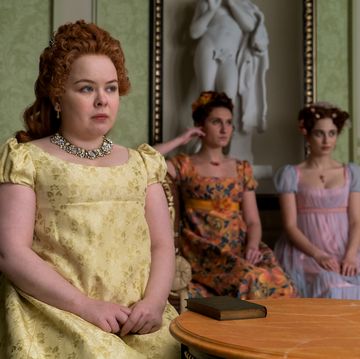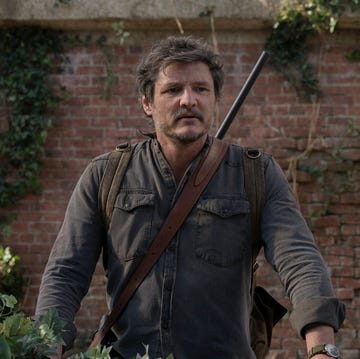When Esther found out she was pregnant, she cried and cried. She was the head girl at her school in Zambia, she played hockey, she did well in her exams - now wasn't the time to stop and raise a child.
All of a sudden she couldn't concentrate in school. She didn't turn up for her mock exams and when the list of pupils who had passed was pinned up on the wall, Esther's name was at the bottom.
'I kept thinking why is this happening to me?' she tells ELLE UK. 'My dad called me over and asked me: “Now that you are pregnant, what are you going to do?” And I told him: “I’m not going to get married, because I’m not yet ready. I’m only 16. I want to go back to school.”'
Thankfully Esther was one of the lucky ones - she had the support of her family. Prior to this she'd received no information about contraception ('I thought it was only for married women') but her mum went with her to have an IUD fitted.
'I have one child but I don’t want any more for the next five or six years,' she says. 'People are not going to know that I have [the IUD]. It’s really secret. Its only me who’s going to know about it.'
Esther's story is just one of three depicted in a new graphic novel, No More Fairy Tales, published by Marie Stopes (the NGO that provides safe abortion services in 37 countries worldwide). To mark World Contraception Day, young women from Zambia (Esther), Senegal (Moussouba) and Nepal (Rita) have shared their experiences of teenage pregnancy.
The aim? To highlight what happens when communities, schools and parents don't inform young people properly about contraception, or provide adequate sex education.
'I thought that contraceptives could give you cancer, that it would make you unable to have children in the future. I thought the implant could travel in your body, pierce your heart and kill you,' says Esther. 'I was scared. Why would I want that in my body?'
Many withhold information in the (mistaken) belief that teenagers will delay sex until after they are married. Yet even once married many girls (who are still very young) face pressure to have children almost immediately - again without the facts they need to make an informed decision.
The numbers, as a result, are pretty shocking. According to Marie Stopes, three out of five adolescents worldwide – that's a whooping 23 million young people – who want to use contraception to prevent an unplanned pregnancy are being denied it.
While each year, 5,600 teenage girls – that's 15 every single day – die as a result of unintended pregnancy, childbirth or in many cases unsafe abortion.
As Esther says: 'If you’re 18 and you already have two children, your dreams are shattered.'
Still, three powerful women are fighting back against stigma and demystifying the myths around contraception to help others avoid the same fate. The graphic novel, which was illustrated by Bryce Gladfelter, is being sent to 37 countries for anyone (and everyone) to read.
Above all, it's a way of celebrating the new wave of courageous young people who are taking matters into their own hands to drive change.
It's pretty simple, says Esther: contraception transforms lives.
'Girls don’t have to worry about pregnancy, or stopping school,' she says. 'They can get an education and achieve their dreams.'

















